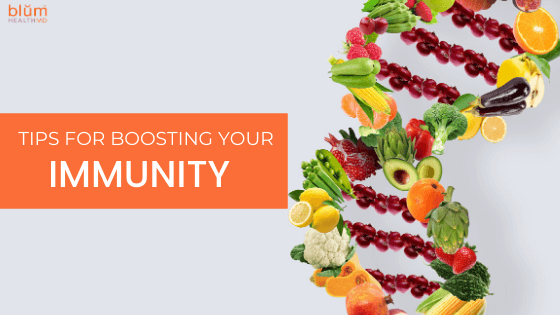
Adaptogens are the wellness industry’s latest buzzword – adaptogenic lattes are popping up in salad bars and blends are finding their home on the shelves of apothecaries. Some adaptogens, like ashwagandha, can be taken in a powdered form. While others, like Lion’s Mane mushroom, can be a nice dinnertime side dish. So, what are they?
Adaptogens are a category of herbs and mushrooms that help balance your body’s reaction to stress by modulating its hormonal and physiological functions. Adaptogens improve adrenal function, protect you from disease, boost immune function and improve overall well-being. Adaptogens help your body handle stress. They are meant to bring us “back to the middle.”
Top Adaptogenic Herbs and Mushrooms
Ashwagandha
What it is: Ashwagandha, also known as “Indian Ginseng,” is a powerful Ayurvedic root that can help your body manage stress.
How it’s consumed: You can add ashwagandha to smoothies and teas. You can buy ashwagandha in powder, capsule, or tincture form.
What it tastes like: In Sanskrit, ashwagandha means “smell of the horse”, which refers to its interesting smell, and supposed ability to increase strength. It tastes slightly bitter, with herbal undertones, but pairs very well with creamy, cocoa flavors.
What it does, according to science: This Ayurvedic root helps reduce long-term stress and alleviate the hormonal imbalances that result from chronic stress. All without inducing a sense of fatigue, ashwagandha helps you build up tolerances to stressful situations, and relaxes an anxious mind. Some research suggests that Ashwagandha helps combat stress-induced weight gain.
Eleuthero Root (Siberian Ginseng)
What it is: Eleuthero root, also nicknamed “Siberian Ginseng,” has been part of the herbal repertoire of Traditional Chinese Medicine for centuries. There are more published scientific studies on eleuthero root than any other herb – and when you dig into the research it’s easy to see why so many scientists have been fascinated by this stringy, beige root. Not only has it been shown to decrease stress, but it has immune-boosting properties to boot.
How it’s consumed: People usually take the root and stem extracts of the eleuthero plant either as a tincture or as a powder. Either way, it can be added to smoothies, lattes, or other drinks and tonics.
What it tastes like: We’ll tell it to you straight: Eleuthero root is bitter, and not exactly a pleasant taste. This is definitely not a herb you’ll be downing with water (unless you’re super hardcore).
What it does, according to science: Siberian Ginseng decreases fatigue by increasing your work and exercise capacity without the “crash” that comes with a morning cup of coffee. With this herb, you’ll also recover faster from acute stress and intense workouts. Some preliminary research also suggests that eleuthero can protect against cognitive decline and reduce DNA damage.
There is abundant scientific research confirming their adaptogenic properties such as the ability to help the body resist a stress response in a non-specific way and the ability to help the body maintain homeostasis. Primary adaptogens directly influence the hypothalamic-adrenal-pituitary (HPA) axis in response to stress.
Reishi Mushroom
What it is: Reishi is an adaptogenic mushroom that has been a staple of holistic wellness and herbal medicines for decades — over 200 to be exact. As a species of the “woody” mushroom family, the fan-shaped ‘shroom boasts orange to reddish-brown hues and can be found in the forest areas of Asia, Europe, South America, and the United States. Reishi’s effects on the body are widely ranging – it’s been shown to have anywhere from anti-depressant qualities to anti-fatigue effects on the body.
How it’s consumed:Reishi mushroom has a tough, thick form that is hard to bite into – it’s definitely not a mushroom that you can just cut into and stir fry with your dinner veggies. Most consume it as a dehydrated mushroom powder, or in a liquid tincture form. Though, some cut the mushroom into long strips, then steep it in hot water to make tea.
What it tastes like: This isn’t the most delicious mushroom you’ll taste. Reishi has an earthy bitterness that has been compared to tree bark.
What it does, according to science: Reishi mushroom’s positive effects on the body are widely ranging. It’s been shown to decrease depression and work as an anti-fatigue agent in a population of breast cancer patients. There’s also ongoing research into whether the trace amounts of cytotoxins found in Reishi could be used in targeting cancer cells.
Maca Root
What it is: Maca is a plant native to Peru that has been traditionally used to improve energy and stamina, while also improving sex drive and fertility. It looks like a cross between a turnip and a radish, with thick rosemary-like leaves. Different varieties come in different colors: red, pink, black, and yellow.
How it’s consumed: For most, maca root is supplemented as a dried powder. The caramel-like taste mixes very well into smoothies, lattes, and even the occasional oatmeal bowl.
What it tastes like: It has a delicious caramel-like flavor, with a subtle earthy aftertaste. Out of all the adaptogens, some vote for maca root as the best tasting.
What it does, according to science: This Peruvian root, long used by Spanish royalty, helps improve memory recall ability and overall learning ability. This super root is also known for its ability to protect against depression and age-related cognitive decline.
Rhodiola Rosea
What it is: Also commonly called “Golden Root” and “Arctic Root”, Rhodiola typically grows in the cold, mountainous regions of Europe and Asia, as well as high altitudes in the Arctic region, such as Finland, Norway, and Russia. Historically, people in northern regions of Scandinavia and the Nordics have used Rhodiola for anxiety, fatigue, and depression, People also have used it to increase physical endurance and to improve resistance to high-altitude sickness.
How it’s consumed: Typically it’s taken as an extract that confers both 3% rosavin and 1% salidroside.
What it tastes like: It actually tends to taste somewhat sweet with only a slight bitterness, which allows it to mix very well with many drinks and desserts.
What it does, according to science: It has been shown to help with physical performance in non-athletes by modulating cortisol levels after exercise-induced stress, and to reduce general anxiety as well. Note: it is not recommended in high amounts for pregnant women or those taking Warfarin.
Schisandra Chinensis
What it is: Known also as “Omija”, it is a bright red berry that is natively found in China, where it has been used to make medicine, tea, and wine for centuries.
How it’s consumed: Normally it’s taken in the form of dried powdered fruit, although can also be found in the form of whole dried fruit, juice, or part of a tea blend.
What it tastes like: Called “the five flavor fruit” in Chinese, it has an interesting mixture of flavors described as sweet, salty, bitter, pungent, and sour.
What it does, according to science: It possibly reduces anxiety, and could affect cortisol levels, although most of the research from numerous human trials that were done in Russia have been kept secret. New research is still being currently done however and shows promising possibilities, and the fruit itself is high in beneficial lignans which can aid in maintaining a healthy bacterial gut biome.
Angelicae Sinensis
What it is: Natively referred to as Dong Quai (which translates to female ginseng), this antioxidant-rich, adaptogenic root has long been cultivated in Traditional Chinese Medicine for its health effects in women. Although most likely first widely cultivated in Asia for medical purposes, this nomadic herb canalso be found in the middle east and eastern Europe, and possibly originated in modern-day Syria. It is also very commonly used as a botanical in many popular gins.
How it’s consumed: The root is normally dried and/or powdered and can be found in loose powdered form or with the powder encapsulated into pills.
What it tastes like: Bitter and earthy, but with a very subtly sweet and flowery undertone.
What it does, according to science: The polysaccharides in Angelicae Sinensis have been shown to cause hematopoietic effects in both animal models and in humans, meaning it aids in the formation of new red blood cells and thus could aid in the bioavailability of other compounds in the bloodstream, as well as having anti coagulative effects. There is also some evidence that it does indeed affect the female reproductive system with a kind of hormone regulation and is, therefore, advised to not take it if pregnant.
In Closing….
Adaptogens can have a wide array of benefits to the human body due to the balancing effects they can bring and have properties that can truly aid against the added stresses and anxieties of a modern lifestyle. Adding adaptogens into your diet or taken as an added nutritional supplement could bring some health benefits – at least based on current research – and they are similar in their role against stressors as antioxidants are to oxidizers.
Jennifer L Jennings, DNP is a board-certified Family Nurse Practitioner with a doctoral degree in nursing practice (DNP), an IFM Certified Practitioner, and a diplomate for the American Academy for Anti-Aging Medicine (A4M). She explored functional medicine for her own health journey and observed her body healing through dietary changes, stress management, GI healing and key supplements as well as bioidentical thyroid management. She knew in that moment that the foundations of functional medicine were the comprehensive medicine that she wanted to discover, learn and deliver to her patients. Book an appointment with Jennifer through Blum Center for Health by calling 914.652.7800



